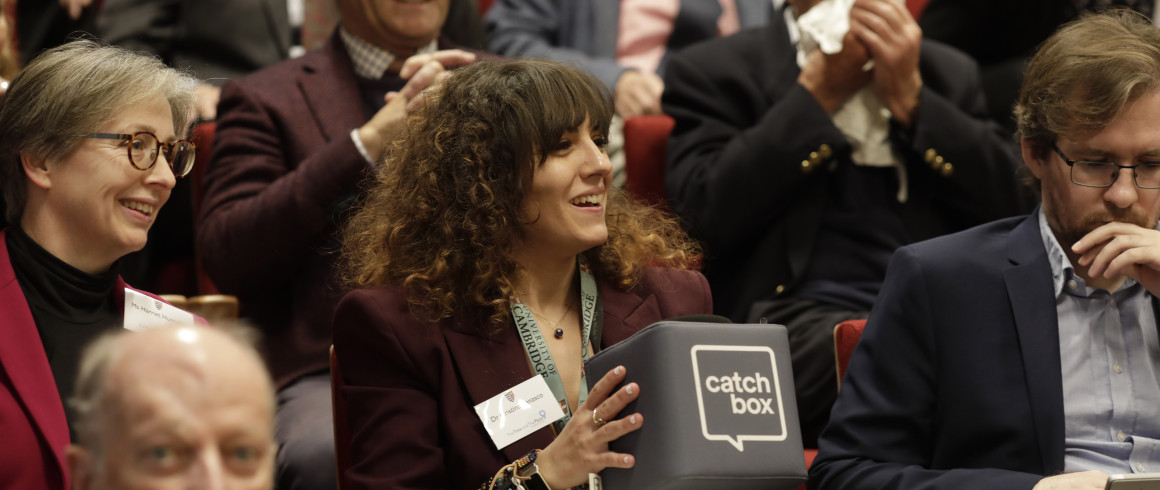The 17th William Pitt Seminar - Who's in charge?
William Pitt Seminar 2022 - Who's in charge?
When the William Pitt Seminar asked this question, on the day the Chancellor of the UK departed after 38 days in post, the audience were yet to witness the shortest-lived Prime Ministership in history. So the question, originally devised some months ago, seemed presciently apposite, although the Seminar was in fact focusing its gaze on our precious and fragile climate.
The Master of Pembroke, Lord Chris Smith, began by welcoming our in-person audience in Selwyn College and our online audience on Zoom who joined as part of the Cambridge Zero 2022 climate festival. Referring to the day’s events, Lord Smith scotched the rumour that the William Pitt Seminar title had anything to do with the chancellor’s resignation. Noting that last year the Seminar asked ‘What should come from COP26’ and that the hoped-for action had not materialised, the Master suggested that this year we would be asking who is in charge and who should be in charge. The Seminar hoped to explore what individuals, NGOs, universities and businesses could do in the absence of meaningful political leadership, and thus take charge of the answers to the climate crisis.
The 17th William Pitt Seminar was expertly chaired by Professor Emily Shuckburgh, Director of the University’s response to climate change – Cambridge Zero. Emily was particularly interested in guiding the debate on how we can empower and enable a very wide range of participants in the decision-making for the future of our planet. But first she presented how critical it is to take action; our climate has changed faster than scientists predicted and the impacts are already being felt both close to home and worldwide.
Our first speaker, Professor of Planetary Computing and founder of the Cambridge Centre for Carbon Credits (4C), Anil Madhavapeddy, gave an academic perspective – not only describing his impactful research, but also demonstrating the power of bringing together a multi-disciplinary network to bring about real improvement. He started with the bad news that we are currently in three simultaneous and interconnected crises - a carbon emissions crisis, a biodiversity crisis, and desertification. New and improved satellites, and our increased ability to analyse the massive volumes of data they produce, have given us a global tool in the fight against these crises by providing a snapshot of planetary health. This data can be used to inform governments as to the consequences of their actions, but Anil is going a step further by developing a digital platform for verifiable and trustworthy carbon credits using and analysing data from satellites. He ended by suggesting that we all have agency, we can all take action, and we are all in charge.
Following Anil, Professor David Cope of Clare Hall and former Director of the Parliamentary Office of Science and Technology, spoke about the importance of connecting the academic evidence base with policy-makers. He has a long-standing interest and knowledge of climate change from well before it was on the international agenda. David suggested that there were more crises and that health, food, and the oceans can all be considered as also in crisis. He counselled against using terms such as climate catastrophe and instead use of non-polemical terms such as ‘climate issue’, and argued powerfully that it would only be addressed by international action. He forcefully rejected ‘Trumpist’ nationalism – and argued for the revivification of the UN and its associated agencies.
Presenting last, Pembroke College alumnus and CEO of Octopus Energy, Greg Jackson (1991), spoke about the role of business in taking charge of a better future. Continuing the theme of the other speakers, he also added extra related crises – the cost of living crisis and the national security crisis. Today, thanks to the work of governments and scientists, we have an alternative to fossil fuels and renewable energy is cheaper to generate and the cost is dropping every year. The economics is clear, but what is holding back change? Greg argued that this was due to the power of incumbency. Our current energy system is built around oil and gas - what we really need to do is to begin the process that makes the clean solutions better than the dirty ones. He suggested the use of universal carbon taxes and deregulation to unleash innovation, stimulate human inventiveness and create a completely new renewable energy system.
Emily then led a discussion with the panel, starting with the first question ‘if you were in charge, what single thing would you do to prioritise the climate?’. Subsequent questions, including those from the audience, provoked much discussion and some real disagreement among the speakers before Emily and the Master brought the 17th William Pitt Seminar to a close. Discussions continued on the walk back to Pembroke and over dinner. Next year we are thrilled that we will be able to host the entire event in Pembroke following the opening of our new auditorium in the United Reformed Church as part of our transformational Mill Lane development – we are looking forward to again tackling a topic of vital interest with eminent speakers, until next year!
See the recording of the 17th William Pitt Seminar ‘Who’s in charge?’ on YouTube.
The William Pitt Seminar is a flagship annual event in the Pembroke calendar and is organised by the College’s Corporate Partnership Programme. For recordings and write-ups of past Seminars, please see this page.


